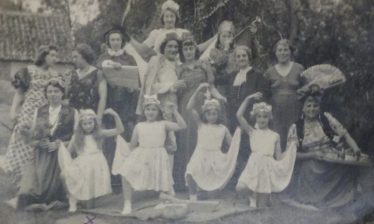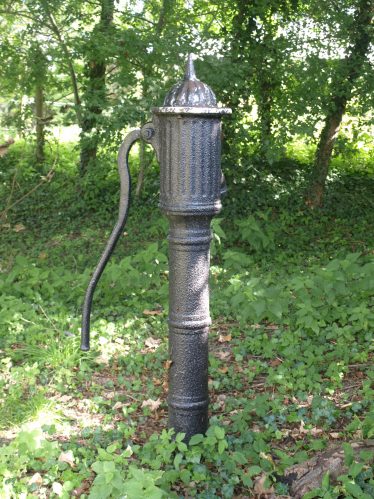My Memories of Growing Up in Meldreth





Introduction
I was born in the Church House, Meldreth in 1935. My parents were Rose and Leslie Turner. My name is June Rose Pearmain, née Turner.
My Childhood in Meldreth
I’d like to tell you as much as I can remember of my life in the village up to the age of 11, at the time we moved to Bishop’s Stortford. Even though I had TB at seven my life in the village was idyllic. My parents were caretakers of Church House, and the Church.
When we moved from Church House, Mr C W Dunn, writer of the Burma Dictionary, gave my father a job as gardener, and had a house built for us on the left side of Brewery Lane. But I think then it was Manning [Manting] Lane, and Mr C W Dunn’s house, now Brewery, was Manning [Manting] House.
There were cows at the end of the lane, I think owned by the Peppers, and I can remember my father teaching me how to milk a cow. Also, the orchard was on the right and it was mostly greengages and plums. There were pigs in the orchard and geese for Christmas.
Something was delivered weekly by horse and cart. I don’t remember what it was, but my mother and our neighbour used to rush to get the horse droppings with spades in hand, for the roses.
Childhood Games
There was a lot of laughter and the games we played were climbing trees (I like to think I was better at it than the boys), Cowboys and Indians and marbles. We used to play marbles on the way home from school, in the gutter opposite the Stocks.
When in war time we played “airman” on a tree opposite Brewery Lane we would climb the tree then hang by our arms and shout out ‘bale out’. We also looked for aeroplane glass. We also played a lot by the river, and I remember that the boy next door had a large boat that we sometimes took into the river. When the army moved into Church House we would crawl through the bushes to their dump and bonfire, to look for badges and hats to dress up in.
Wildflowers and Nature
There were a lot of wild flowers in the village. In February the churchyard was a carpet of snowdrops. In the spring there were bluebells behind the church and wild daffodils in the field opposite Brewery Lane, and round the edge of the field primroses and violets. Where the edge of the village right side was damp by the river there were kingcups and harebells.
There were three walnut trees that I can remember, one small just inside the church graveyard and a large one outside in the field, and one on the other side of the village at a big gloomy house owned by a Mr Ellis. It was more fun stealing those as he would chase us with a big stick. The house was quite near the school.
One of my favourite things was to go wooding with my mother, and she loved to do it too. We would go fishing for tiddlers in the river beside Sheen Mill. Also we had picnics beside the river at the [Topcliffe] mill, opposite Church House.
I used to play with a boy called Billy. He lived the other side of Church House and I remember he pushed me into the nettles. We used to play with frogspawn in a pond at the side of Matlock’s [Mortlock’s?] property. There was a pump beside a cottage a little way down from the Stocks.
I went to Sunday School at the Church and took it in turns to pump the organ. After I would go for a Sunday walk with my parents. My father also worked on a farm and in the holidays I would sometimes go with him. We had cold tea in a bottle and thick sandwiches. I would play in the stream and haystacks, and often I would find eggs. My mother said not to tell anyone. Sometimes at the end of the day my father would take me home in the horse and cart.
Wartime
I remember seeing a doodle bug, as we called them, going past our window, and when the engine stopped we dived under the beds. Thank goodness it landed in the fields. Also I remember my father saying there was a dogfight going on in the sky. At night we would stand in the garden and the sky would be lit up. My father said, “London’s getting it tonight.”
School
Inside our school we had a huge poster on our classroom wall that said ‘All things bright and beautiful’. Our teacher had her small dog in a basket in front of the fire. As I had TB at the age of seven I was given special treatment. I had a small bed in the classroom and at certain times I had to rest. My teacher had a very large jar of cod liver oil and malt. She would say open wide and put a large spoon in my mouth to eat outside. We had a nurse who came to the school in a caravan to look for nits, and one for the dentist. When that one came I used to hide.
Sheldrick’s Farm
Just past the school there was a track down to Sheldrick’s farm, where we had dancing lessons. Sometimes the farmer would put us girls on the back of a large horse to take us home. Mrs Sheldrick put on a Cinderella show in wartime and us girls were fairies and a very pretty girl called Enid was Cinderella. She had curls and later married Bob Martin. To make us smile Mrs Sheldrick used to say, “pretend Hitler is at the back of the hall.”
In some small cottages near the school there was a lady who used to make rag rugs, and people gave her their old clothes. In the other cottage lived Joe and Mary Kelly, with daughter Jane who sadly died.
Royston
On Saturday we would go to Royston. I would have a toffee apple and go to the pictures, and have tea in town with a plate of cakes. The waitress would wear a little white pinny and a white cap in her hair.
We did not have a lot of money to buy new toys so my mother used to bike to Royston Auction on a Wednesday and came back with her basket full of toys and books. I used to be so excited seeing her come down the lane. The auction room was very good and they sold everything you needed. My father was a bit of a rogue. His mates and himself would catch pigeons in the belfry and steal ducks from local ponds. Something more I remember in wartime was there were heaps of bombs along the back road to Bassingbourn.
When it snowed we would take our sledge to Royston Heath on the bus. We had to be careful we didn’t run into the prisoner of war camp.
Conclusion
I am writing [in 2015] about life seventy years ago and wonder if anyone remembers? I often wonder what my life would have been like if I has stayed in Meldreth. Maybe I’d have married Billy!





No Comments
Add a comment about this page